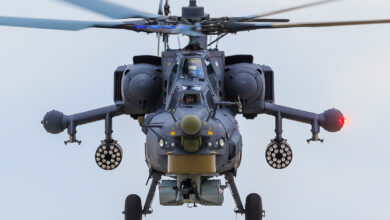UK’s silent support for Ukraine’s missile strikes on Russia

As a former military officer and defence analyst, I have spent my career navigating the complexities of geopolitical strategy and military operations.
Today, I find myself caught between two worlds: the need for strategic caution and the moral imperative to support Ukraine in its fight against Russian aggression.
The current speculation around Downing Street’s stance on the use of Storm Shadow missiles by Ukraine perfectly encapsulates this tension.
It’s no secret that the UK has been a steadfast supporter of Ukraine since the onset of the war. But when it comes to publicly backing Ukraine’s use of Storm Shadow missiles against Russia, the British government has been uncharacteristically coy.
From my conversations with high-ranking military personnel and my own experiences, I believe there is more to this silence than meets the eye.
President Volodymyr Zelensky has been clear in his requests: Ukraine needs the Storm Shadow missiles to strike deep into Russian territory. These missiles, capable of evading enemy radar and hitting precise targets up to 190 miles away, could provide Ukraine with a significant tactical advantage. However, using them requires a nod from the US, given the intertwined nature of Western military systems. Here’s where things get tricky.
Despite what the public statements suggest, I am convinced that there is tacit support from Downing Street for Ukraine to use these missiles. It’s just that no one wants to say it out loud. Why? Because doing so could spark a diplomatic row with the US, and that’s a risk no one in Westminster seems willing to take at the moment. Washington, for its part, is wary of escalating the conflict. They’ve made it clear that they are concerned about the implications of Ukraine using long-range weapons inside Russia.
The reluctance of the UK to make a formal request to the US on this matter is telling. It suggests a deeper fear of pushing the Americans too far, too fast. And while I understand the need for caution, I can’t help but feel that we are missing a crucial opportunity to support an ally in need.
From what I’ve gathered in recent polls and discussions with fellow former military officers, there’s a growing sense of frustration with the current stance. The consensus among many is clear: we should not be tying Ukraine’s hands. One retired officer I spoke to summed it up perfectly: “The Americans have been scaring themselves about escalation so far, but I think they’ll relax restrictions soon. Putin’s not going to do anything dramatic, in my opinion.” This sentiment echoes my own thoughts.
If Russia can use Iranian-supplied drones to attack Ukrainian cities, why shouldn’t Ukraine be allowed to use Western-supplied weapons to strike back? As one former Gurkha officer put it to me, “Western governments need to grow a backbone.” I couldn’t agree more. The idea that we provide Ukraine with powerful weapons but then dictate how they can be used is, frankly, absurd. It’s like giving someone a Ferrari but telling them they can’t drive it over 30 miles per hour.
Of course, there are valid concerns about escalation. One senior civil servant in the Ministry of Defence mentioned to me that if Ukraine were to use Storm Shadows to hit a strategic target like an S400 battery protecting Moscow, it could create massive political challenges. But that’s the nature of war—every action carries risk. The key is to manage these risks without undermining our allies.
Preventing Ukraine from using these weapons to their full potential only prolongs the conflict. It allows Russia to continue its attacks on civilian and industrial targets in Ukraine, which is a war crime in itself. We are effectively allowing Russia to maintain leverage as winter approaches, when the humanitarian cost will be even greater. One former cavalry officer told me that not allowing Ukraine to defend itself properly “prevents Ukraine from defending itself and potentially allows Russia significant leverage as we approach winter.” This isn’t just a military issue; it’s a moral one.
Personally, I think the fear of nuclear escalation has been overblown. A retired tank regiment officer suggested to me that we could continue to publicly deny permission to Ukraine while covertly allowing them to use the weapons. This dual approach could be a way to avoid provoking Russia while still giving Ukraine the means to defend itself. It’s a pragmatic solution, but I wonder if it’s enough.
I firmly believe that Ukraine should use every tool at its disposal to reclaim its territory and push back against Russian aggression. Now that they have occupied Russian land, the argument for restraint seems moot. As one former divisional staff officer remarked, “The most important thing is [for Ukraine] to get Crimea back, so if they are going to create pain, it should be with that in mind.”
At the end of the day, we have to ask ourselves what kind of allies we want to be. Are we willing to stand by Ukraine, not just in words but in actions? Or will we continue to play it safe, hoping that this approach will somehow lead to a resolution? From where I stand, the choice is clear. It’s time to let Ukraine fight back with everything they’ve got. The stakes are too high to do anything less.





